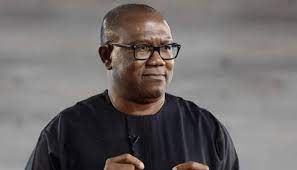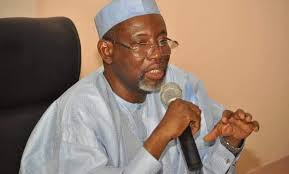EMEKA NZE examines the anxiety and apprehension that took Nigeria’s centre stage due to election tales and rumours of war and anticipates a replay as March 28 nears
An argument ensued between two men last weekend on the election and pronto, the argument degenerated in a shout and howling of abuses against each other. “Why will you say that Buhari will import Arab machineries to join Boko Harm in fighting the militants in the Niger Delta,” queried the first man. “You are biased, you must be an APC member”, retorted the other man. “You too, I know you are PDP”, the first man replied. The argument later assumed a bigger dimension as the people in the vicinity joined one side of the divide and attacked or favoured the Buhari or Jonathan man in the argument.
At the vendors’ stand, small groups of youths had gathered every morning and reacted to newspaper headlines taking the sides of their favoured candidates and party and deploring the writer of every headline perceived to be tilted against their favoured candidate while supporters of another candidate hail the writer of the article for a job well done. In the melee politicians are hailed while others are smeared with abuses. If you happened to be in the milieu, you too can be tempted to take sides in the conflict. Similar scenarios played out in the city centres even in the villages as one form of argument or the other surrounding the elections and the politics of our country take the centre stage in many fora.
The political tension and apprehension in the Nigerian firmament may have receded albeit temporarily with the announcement by the Prof Attahiru Jega led Independent National Electoral Commission (INEC). Although it is a postponement of the evil day, the subsiding of election tales and rumours of war in homes, markets, schools, relaxation spots, schools, offices including private and public cannot be overemphasized.
At a hospital in Abuja before the announcement, instead of finding workers committed to their duties after the strike, men and women sat in groups discussing elections issues and the anxiety that it brings. The euphoria of resumption of duties paved way for regrets that it would have been better if the elections were over. Hear them: “They shouldn’t have called off the strike until after the elections,” the first woman said. “You are right, my sister.
My mother in law has just called my husband that we should return home to the village. According to her, there will be war after the elections and she doesn’t want us to be caught up in the disaster”, said the second woman. While they chatted, a young man came in with a file and said the sectional head needed an immediate work on the file. With visible anger on her face, the first woman who was engrossed in the office gossip retorted, “Go tell the sectional head to wait till after the elections; is he not aware that Nigeria is burning?” In disappointment, the messenger moved out from the office with alacrity.
While some people at the urban centres waited out of necessity, probably for the approval of their leave applications which must coincide with the election time, or waited for schools to be closed because of the elections to take their families to the countryside, some others cared less for such delays and had already zapped before the yuletide to come back whenever the elections and its accompanying brouhaha were over. The phone conversation between two friends, highly placed personalities, one retired and the other still in service, surprisingly of the security service further underscores the election anxiety.
The man still in service was telling his friend that he was on his way to his village with the family for their safety. After the telephone chat, the retired officer explained to his listeners that he would have travelled too but his wife and children live and worked in Abuja.
To him, he did not care much but the love of his wife and children who work in Abuja has forced him to pray for the future wellbeing of the country. To him, if a serving security personnel like his friend “will run away to the village with the family for fear of election crisis means that the country is in a real shit”.
Places worship – the churches and the mosques instead of diffusing the tension and anxiety have aggravated it. While they have taken sides, faithful are fed with prophecies of cataclysmic proportions, frightening tales and rumours of wars foul the air in the worship centres. Thoughts of probable violence have become so rife and widespread among citizens that those in the villages are sending distressed calls to their beloved ones to return and in response; families are being ferried to the countryside for reasons of safety.
Like the National Orientation Agency (NOA) said, they have truly abolished voters’ apathy, Nigerians no longer have nonchalant attitude towards election, not that all are armed with Permanent Voters Cards (PVCs), the people are no longer ignorant of the electioneering happenings, citizens ears are agog to political discussions, not that they are willing to vote but eager to know who emerges as their leader or leaders while many are praying that this election cup passes over them.
While the politicians are junketing round the country dancing and making melody in carnival-like political campaigns and preaching divisions, life in other sectors seems to be stagnant.
This is the reason for the waiting game which seems to say that until the elections are over, nothing else can go on. A comedian in one recent joke on the elections captured it thus: “Spouses who make requests of their partners are told to wait until the elections are over; parents tell their children to hold on until after the elections before they will meet their needs. From the way things are going, traders and those rendering services will soon discharge their customers with the excuse to come back after the elections.”
As the February 14 has become a mirage, analysts caution INEC to beware of the ides of March. The waiting game and the associated rumours of war seem endless. This is perhaps the reason for the questions from the media men who attended the Jega’s press briefing which lasted till 12 midnight. To many Nigerians, the germane question here is supposing the security agencies failed to crush the insurgents in the north east, the major raison de ta for the postponement, will the election be further shifted? Jega did not seem to have the answer and nobody except the security forces knows their reinvigorated capacity to win the war against the insurgents. But the only consolation is probably a show of patriotism which finds expression in rebuffing pessimism or cynicism and replacing with hope and unflinching optimism.
Many Nigerians still have countless questions on their lips: What happens to those Nigerians who ran away to their villages with the hope to come back after the elections? Will they now come back or wait till April when the elections would have been concluded and results announced? Those who have put everything on hold till after the elections, will they now find strength to continue their works or wait till the middle of April when the elections results will be announced? Will the tales and rumours of war, the doom prophecies and the instigation and mudslinging on the campaign rostrums and the media which caused the apprehension in the first place seize? What about those who travelled in the pretext to go and vote? Will they now come back to travel again? Will the security personnel and numerous others like him bring their families back and then prepare to run again as the ides of March approaches? Nigerians are still watching and waiting.



